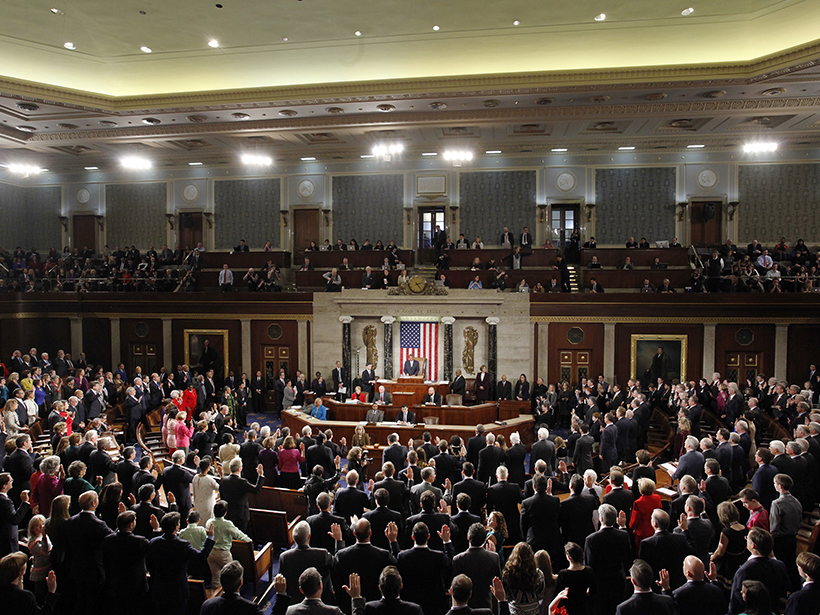One year after federal legislation threatened to restrict funding for the Earth and space sciences, a new congressional caucus has formed to bring greater visibility on Capitol Hill to those disciplines and their impacts on science, policy, and society.
The House Earth and Space Science Caucus, which launched last week, plans to support strong and sustained funding for the Earth and space sciences and the inclusion of those sciences in science, technology, engineering, and mathematics (STEM) educational curricula, according to information from caucus organizers. Reps. Jared Polis (D-Colo.) and David Jolly (R-Fla.) cochair the group, which also aspires to be an information resource for members of Congress and their staffs.
Educating the Congressional Community
At a 14 September event launching the caucus, Polis expressed excitement about the bipartisan group and its goals. He said that the caucus wants “to keep members of Congress in the loop” about developments in the Earth and space sciences.
“In the 21st century, it’s crucial to continue to broaden awareness and align policy with Earth and space sciences,” Polis told Eos. The caucus “will focus on placing scientific research and evidence in the forefront of congressional and national discussions, while also continuing to support ideas that will promote STEM education programs for the next generation.”
The caucus wants “to keep members of Congress in the loop” about developments in the Earth and space sciences.
The caucus, which currently has six members of Congress, aims “to help educate the broader congressional community about all of the important values that [the geosciences] bring to our national security, to the economy, and to our public health and safety,” said Lexi Shultz, director of public affairs of the American Geophysical Union (AGU), the publisher of Eos.org. AGU played a leading role in organizing the caucus and chairs the alliance of groups that support it.
“We want to make sure that members of Congress know what Earth and space science is and how many policy issues it really touches on,” added Julie McClure, science policy manager for the American Society of Agronomy, Crop Science Society of America, and Soil Science Society of America, which are part of the alliance supporting the caucus.
Home on the Hill
Appropriations and authorization legislation in 2015 to restrict and deprioritize geoscience funding helped to galvanize AGU and others to successfully strike the language and organize a caucus, AGU public affairs specialist Brittany Webster told Eos.
“We needed some kind of mechanism where we could keep up the drumbeat about the importance of the geosciences,” she said. “The caucus will serve as a way to bring a lot of very disparate groups and disparate interests and organizations together because we all do Earth and space science in a variety of ways.” The caucus “gives the geosciences a home on the Hill,” she added.
“A little over a year ago, we fought very hard to make sure science got funded,” caucus member Rep. Mike Honda (D-Calif.) told the crowd of scientists, policy experts, and congressional staffers at the launch event. “Count on us to be your colleague and your advocate,” added Honda, who is the acting ranking member of the House Appropriations Committee’s Commerce, Justice, Science, and Related Agencies Subcommittee. Jolly is also a member of the subcommittee.
Kasey White, director for geoscience policy at the Geological Society of America, said that although a congressional hazards caucus and others have addressed geoscience research, the new caucus will “raise the visibility” of the geosciences on Capitol Hill and show broad bipartisan support for geoscience research.
Accepting the Science
Speaking at the launch event, Representative Jolly said that science should not be debated. “I don’t understand why politicians sit up here and debate science. Let’s accept it,” he said. “I’ve got a law degree; I don’t have a science degree. My job is to accept the science and then let’s fight over the policies that ensure we are doing right by the research community and also doing right for long-term solutions for our country and the globe.”
“My job is to accept the science and then let’s fight over the policies.”
Jolly told Eos “there should not be any partisanship when it comes to science. There shouldn’t be politicization of science.” He added that he believes that conservative solutions about climate change, for instance, are right for the environment, economy, and country. “My friends on the left have more progressive solutions, and that’s fine, too. But we can’t have that debate until we agree to accept the science. And that’s the point of this caucus: to accept the science.”
An industry representative at the launch told Eos that the caucus could make a difference by having “a conversation” about the geosciences on the Hill. “To see bipartisan support and recognition of the need for science when we are talking about policies in the realm of Earth science—meteorology, oceanography, atmospheric science, space weather—is refreshing,” said Jamison Hawkins, director of civil space and environmental programs with Lockheed Martin’s government affairs group.
—Randy Showstack, Staff Writer
Citation:
Showstack, R. (2016), Congressional caucus for Earth and space sciences gets launched, Eos, 97, https://doi.org/10.1029/2016EO059699. Published on 21 September 2016.
Text © 2016. The authors. CC BY-NC-ND 3.0
Except where otherwise noted, images are subject to copyright. Any reuse without express permission from the copyright owner is prohibited.

